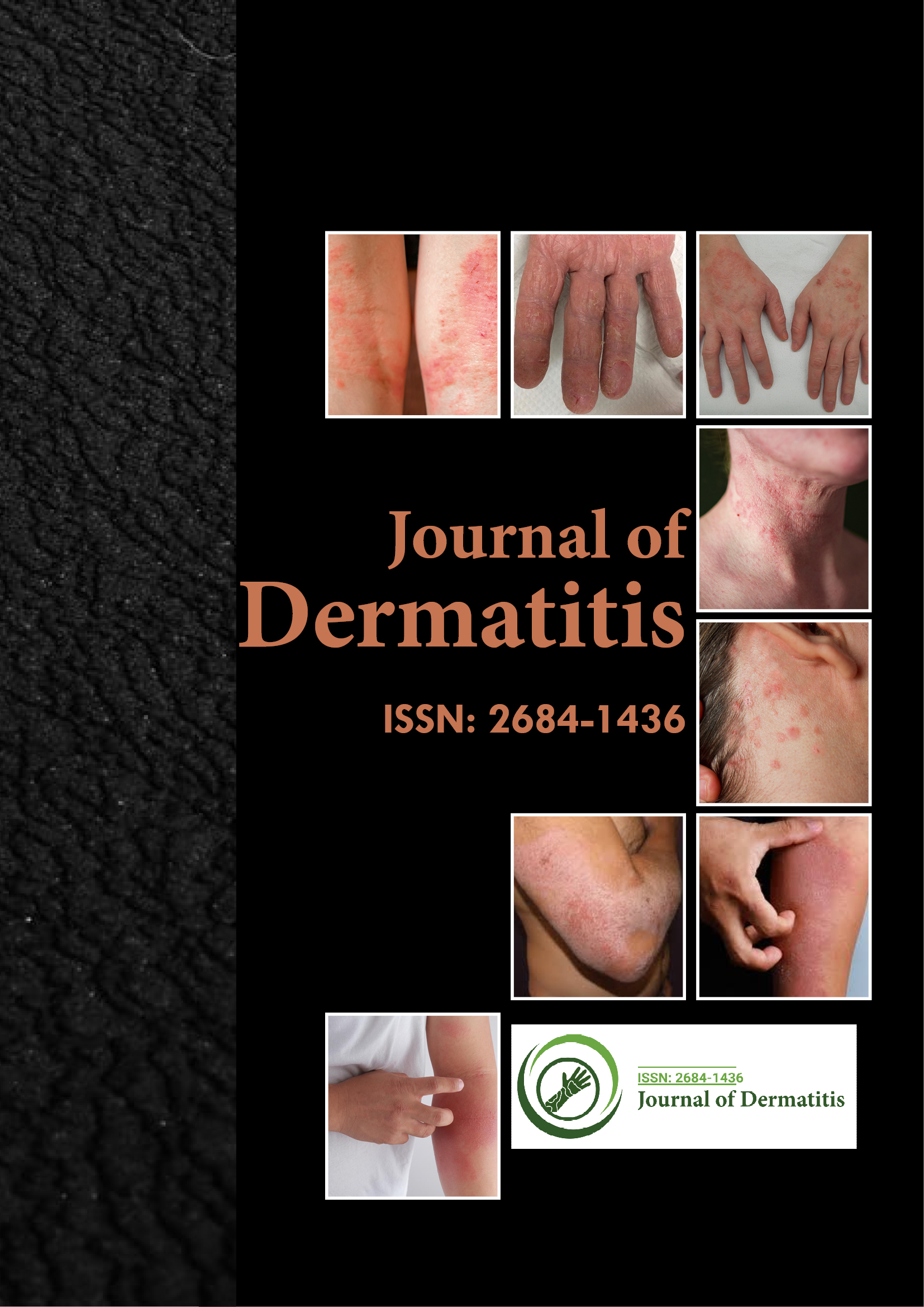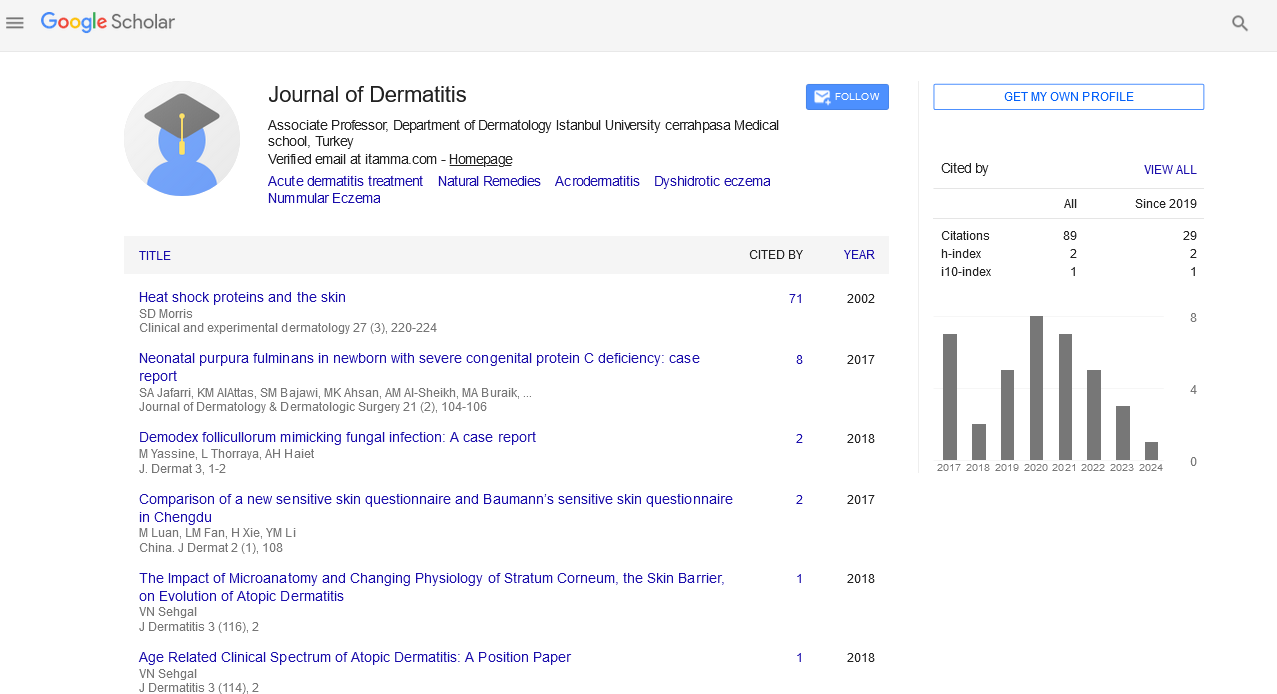Indexed In
- RefSeek
- Hamdard University
- EBSCO A-Z
- Euro Pub
- Google Scholar
Useful Links
Share This Page
Journal Flyer

Open Access Journals
- Agri and Aquaculture
- Biochemistry
- Bioinformatics & Systems Biology
- Business & Management
- Chemistry
- Clinical Sciences
- Engineering
- Food & Nutrition
- General Science
- Genetics & Molecular Biology
- Immunology & Microbiology
- Medical Sciences
- Neuroscience & Psychology
- Nursing & Health Care
- Pharmaceutical Sciences
Commentary - (2023) Volume 8, Issue 2
Treatment for Eczema using Traditional Chinese Medicine
Mouronte Garcia*Received: 01-Mar-2023, Manuscript No. JOD-23-20042; Editor assigned: 03-Mar-2023, Pre QC No. JOD-23-20042 (PQ); Reviewed: 20-Mar-2023, QC No. JOD-23-20042; Revised: 27-Mar-2023, Manuscript No. JOD-23-20042 (R); Published: 03-Apr-2023, DOI: 10.35248/2684-1436.23.8.183
Description
Eczema, also known as atopic dermatitis, is a common skin condition that affects millions of people worldwide. It is characterized by dry, itchy, and inflamed skin patches that can be red, scaly, and sometimes ooze or bleed. While there is no known cure for eczema, Traditional Chinese Medicine (TCM) offers a holistic approach that can help alleviate symptoms and prevent recurrences.
TCM is a system of healthcare that has been used for thousands of years in China and other parts of Asia. It is based on the concept of Qi (pronounced "chee"), which is the life force energy that flows through the body. According to TCM theory, when Qi is imbalanced or blocked, it can lead to disease and illness. Therefore, the goal of TCM is to restore balance and harmony to the body, mind, and spirit.
In TCM, eczema is believed to be caused by a combination of external factors such as dryness, wind, and heat, as well as internal imbalances such as weak digestion, stress, and emotional disturbances. TCM practitioners will diagnose eczema based on a combination of symptoms, medical history, and physical examination. They may also use diagnostic tools such as tongue and pulse diagnosis to assess the overall health of the patient.
Treatment for eczema in TCM may involve a combination of acupuncture, herbal medicine, dietary therapy, and lifestyle modifications. Acupuncture involves the insertion of thin needles into specific points on the body to stimulate Qi flow and promote healing. Herbal medicine may include topical or oral preparations made from a variety of herbs that have antiinflammatory and immune-boosting properties.
Dietary therapy is an essential component of TCM treatment for eczema. TCM practitioners believe that certain foods can exacerbate eczema symptoms, such as spicy or greasy foods, alcohol, and dairy products. On the other hand, foods that nourish the blood calm the mind, and support digestion can help alleviate eczema symptoms. These may include foods such as green leafy vegetables, fish, and whole grains.
Lifestyle modifications may also be recommended by TCM practitioners to help manage eczema. These may include stress reduction techniques such as meditation, yoga, or tai chi, as well as avoiding environmental triggers such as harsh soaps, detergents, and fragrances.
Overall, TCM offers a holistic approach to the management of eczema that addresses the root cause of the condition rather than just the symptoms. By restoring balance and harmony to the body, TCM can help alleviate eczema symptoms and prevent recurrences. However, it is essential to consult with a licensed TCM practitioner to receive proper diagnosis and treatment.
Traditional Chinese Medicine (TCM) is a medical system that has been used for thousands of years in China and other parts of the world. It encompasses a range of practices, including acupuncture, herbal medicine, massage, and dietary therapy, among others.
Potential advantages of TCM
TCM stimulates your body's innate capacity for self-healing. As a result, you'll have more energy and immunity, experience pain relief, inner system balance, improved vital organ health, reduced stress and anxiety, younger-looking skin, and even the prevention of many diseases from developing or worsening. Some of the important advantages mentioned in below.
Holistic approach: TCM treats the person as a whole, rather than just focusing on the disease or symptoms. It takes into account a person's physical, emotional, and spiritual health, and aims to restore balance and harmony.
Personalized treatment: TCM practitioners tailor treatments to each individual's unique needs and constitution. This means that even people with the same diagnosis may receive different treatments based on their specific symptoms and underlying imbalances.
Natural remedies: Many of the treatments used in TCM are derived from natural sources, such as herbs, minerals, and animal products. They are often used in their whole form, which may provide additional benefits compared to isolated compounds.
Low risk of side effects: TCM treatments are generally considered safe when used properly and under the guidance of a qualified practitioner. They typically have fewer side effects than pharmaceutical drugs, which can be a benefit for people who are sensitive to or cannot tolerate certain medications.
Complementary to western medicine: TCM can be used alongside Western medicine to enhance its effectiveness and reduce side effects. For example, acupuncture has been shown to help manage pain, nausea, and other symptoms associated with cancer treatments.
It's important to note that the effectiveness of TCM treatments may vary depending on the individual, the condition being treated, and the practitioner's skill and experience. It's also important to seek treatment from a qualified practitioner who has received proper training and certification.
Citation: Garcia M (2023) Treatment for Eczema using Traditional Chinese Medicine. J Dermatitis.8:183.
Copyright: © 2023 Garcia M. This is an open-access article distributed under the terms of the Creative Commons Attribution License, which permits unrestricted use, distribution, and reproduction in any medium, provided the original author and source are credited.

